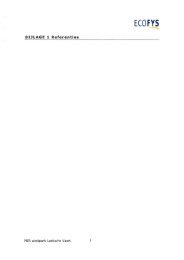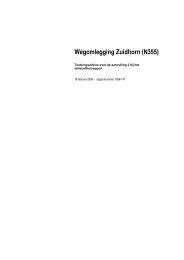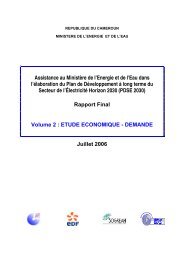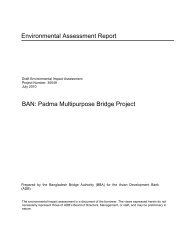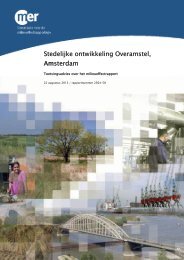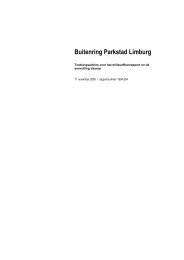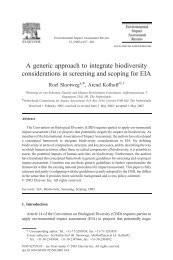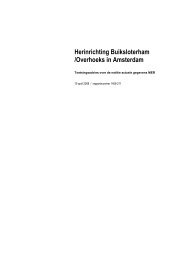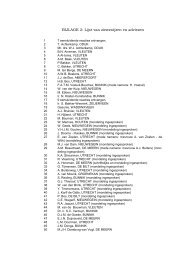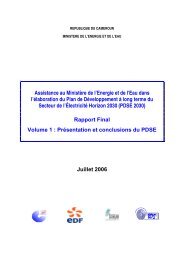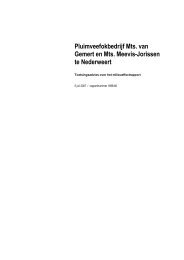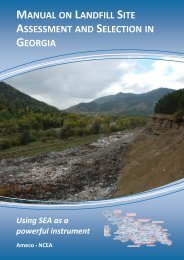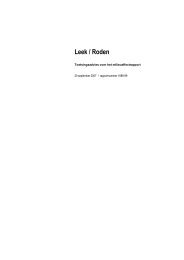Scoping Advice for the Dutch IWRM Support Programme Rwanda
Scoping Advice for the Dutch IWRM Support Programme Rwanda
Scoping Advice for the Dutch IWRM Support Programme Rwanda
Create successful ePaper yourself
Turn your PDF publications into a flip-book with our unique Google optimized e-Paper software.
- For effective implementation of <strong>IWRM</strong> measures, <strong>the</strong> support and active involvement of o<strong>the</strong>rsector departments, local governments, direct stakeholders and <strong>the</strong> general public is needed.The RWRD needs to coordinate this support, and as such can be considered as processmanager of <strong>IWRM</strong> in <strong>Rwanda</strong>. A fur<strong>the</strong>r assessment of capacity needs to fulfil this role asprocess manager is required;- A strategy <strong>for</strong> communication and process management would be needed to guide actualimplementation of coordination tasks. Currently, such strategy, or staff skilled to develop one,are not existent at <strong>the</strong> water department.Transfer of skills & knowledgeThe above mentioned assessments identify needs at all levels. The RWRD employees feel a highurgency to start and deliver quickly. At <strong>the</strong> same time <strong>the</strong>re is hesitation due to a lack of handsonexperience. A lot of experience is currently being gained by consultants through <strong>the</strong>development of <strong>the</strong> different elements of <strong>the</strong> <strong>IWRM</strong> system, such as <strong>the</strong> Master Plan and <strong>the</strong> MIS,yet this experience is not efficiently shared with staff at <strong>the</strong> RWRD. Also, as already observed, <strong>the</strong>focus of <strong>the</strong> Master Plan process is on collection and processing of technical / hydrologicalin<strong>for</strong>mation. Less attention is paid to <strong>the</strong> process of implementation and maintenance of amonitoring system, including <strong>the</strong> capacity needed.The work related to both Master Plan and RIWSP is implemented under <strong>the</strong> RWRD. It is unclear if<strong>the</strong>ir consistency is checked across sectors. The ministries of infrastructure, energy, andagriculture have, among o<strong>the</strong>rs, great stakes in <strong>the</strong> water sector. These have all developed <strong>the</strong>irown strategic policies and plans and may include relevant capacities from which <strong>the</strong> effectiveimplementation of <strong>IWRM</strong> would benefit.The NCEA considers this a risk as it hampers effective learning and concludes that a moreeffective transfer of skills of knowledge, through sharing of and gaining hands-on experience,should be considered a priority. This may become an important role <strong>for</strong> <strong>the</strong> expected TechnicalAssistant whom <strong>the</strong> EKN will finance <strong>for</strong> <strong>the</strong> RWRD.5. The NCEA recommends to develop a capacity development component based on existinginitiatives, looking <strong>for</strong> quick wins, with special attention to capacity <strong>for</strong> process management atRWRD and to operational capacity at decentralised levels. Include a communication strategy,targeted at different audiences. Look at different modalities <strong>for</strong> transfer of skills and knowledge(e.g. twinning, help desk/pool of experts, coaching modalities, o<strong>the</strong>rs) which allow quick learningby doing, making <strong>IWRM</strong> gradually operational in a sustainable manner.18



